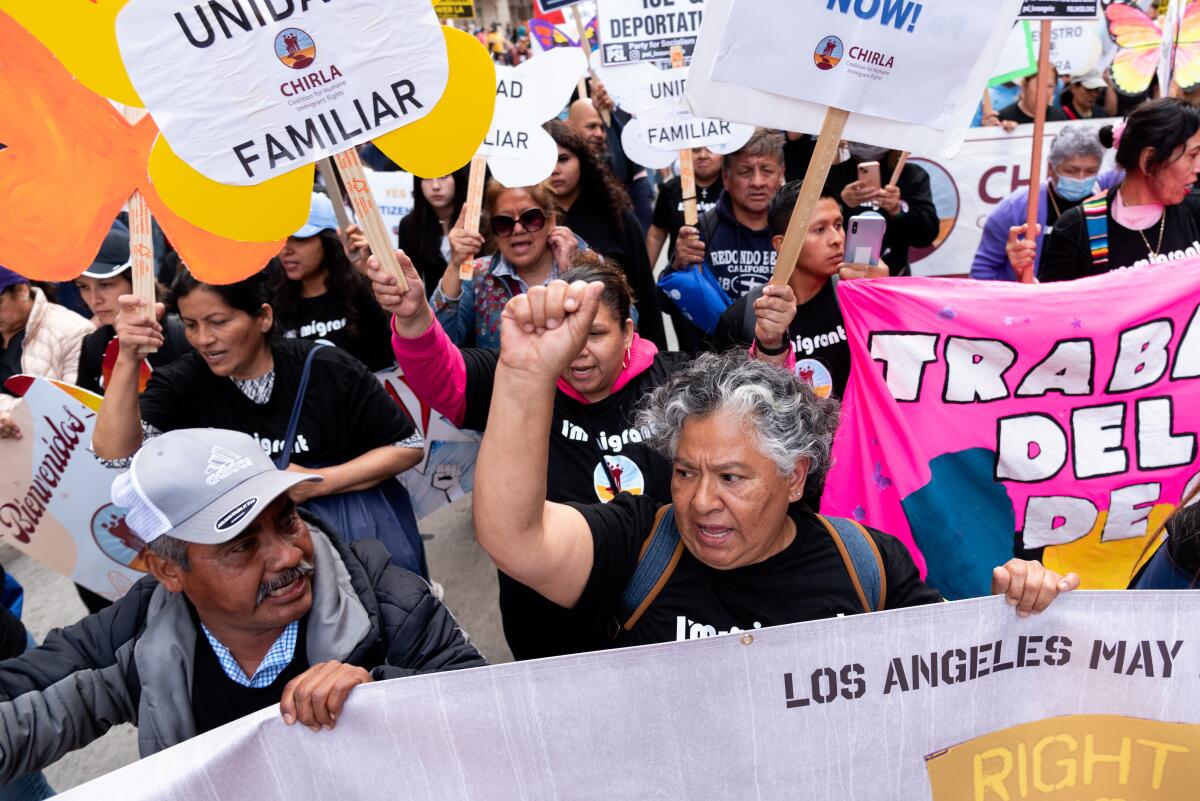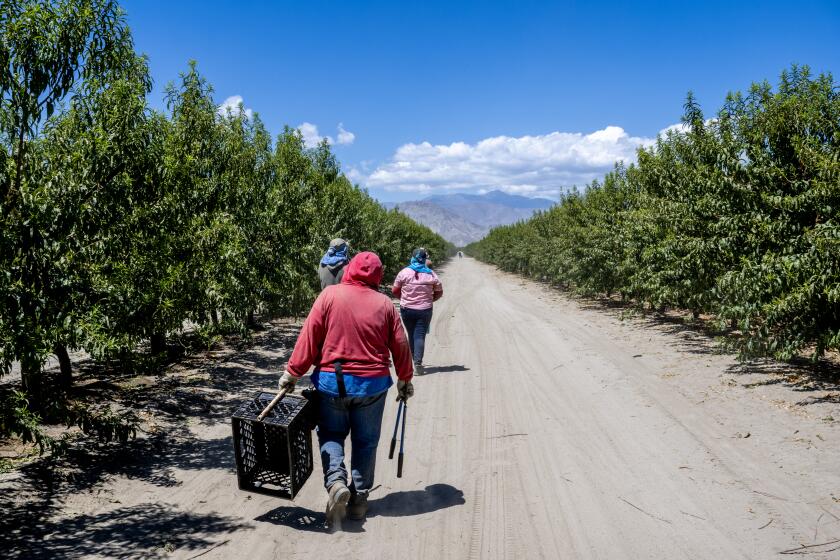Worried about Trump returning to the White House? Here’s how to protect immigrants in your family

- Share via
Former President Trump has made no secret about his plans to unleash historic cruelty and chaos on immigrant families across America.
As he moves to clinch the Republican nomination before any court case can stop him, mixed-immigration status communities must prepare for the worst. Trump’s team has promised that if he wins a second term in November, he’ll launch the largest-ever deportation operation and build mass detention camps for immigrants.
Opinion Columnist
Jean Guerrero
Jean Guerrero is the author, most recently, of “Hatemonger: Stephen Miller, Donald Trump and the White Nationalist Agenda.”
He wouldn’t spare longtime residents with clean criminal records, parents of U.S. citizen children, taxpayers or even green card holders. And he’d punish Americans whose jurisdictions offer sanctuary. His goal is not to uphold laws; it’s to purge the nation of races he says are “poisoning the blood of our country.”
Immigrants and their allies have a choice: Ignore Trump’s threats or work to prevent and prepare for them. I spoke to immigrant rights activists for their recommendations. Here is a set of tactics that could make a difference.
Call Congress now:
Everybody should be calling their members of Congress and demanding legislation to protect law-abiding people in this country. This would greatly limit the damage Trump could inflict if reelected. For instance, the “Renewing Immigration Provisions of the Immigration Act of 1929” would update an existing statute to make millions of longtime residents eligible for green cards.
The former president has a proven record to appeal to the anti-immigrant voters. Rivals should give up trying to pass him on the right.
There are also bills to protect smaller groups that may have a better chance of passing because they have bipartisan support, including the Dream Act for those who arrived here as children and the American Families United Act for the undocumented spouses of U.S. citizens. Those bills need strong advocacy, too.
Get involved with your local immigrant rights organization:
It’s crucial for undocumented people to connect with immigrant rights groups. Don’t stay isolated and invisible, says Angelica Salas, executive director of the Coalition for Humane Immigrant Rights of L.A.
These organizations can provide support networks and connect immigrants with free legal consultations to learn if they qualify for existing protections such as the Biden administration’s deferred action for people who experience labor rights violations. “Part of what [Trump] wants is for our immigrant community to be unknown, unseen and lacking in all protections,” Salas told me. “But we can create spaces where they are seen, they are respected and they will be supported.”
The president could start with work permits for some immigrants in California and other states, then create a parole program for Dreamers and undocumented relatives of U.S. citizens.
Apply for citizenship or help others do so:
Millions of people with green cards who are eligible for citizenship have not applied for the privilege. Given Trump’s desire to deport green card holders, it’s important that they seek citizenship before it’s too late. By becoming citizens, they could also help undocumented relatives adjust their statuses.
People close to permanent residents who haven’t applied for citizenship can help them navigate the process. The National Partnership for New Americans has helpful resources. And anybody can volunteer with a naturalization campaign.
Register to vote or join registration drives:
A Suffolk University/USA Today poll released Jan. 1 shows Trump beating Biden by 5 points among Hispanic voters and by 4 points among voters under 35. It’s imperative that young people and Latinos register to vote as soon as possible to reverse this disturbing trend.
Most of us know young people who don’t want to vote because they’ve become disillusioned with politics. We can empathize with their despair while helping them understand that they can make an impact. Join voter registration drives. Knock on doors, make calls and send text messages. Talk to people.
Tell your story:
If you’re undocumented, consider sharing your story, said Gaby Pacheco, an immigration activist who came to the U.S. from Ecuador as a child and grew up in Miami. “Nobody can tell your story like yourself,” she told me.
Pacheco knows it’s risky. Immigration enforcement detained her family in 2006 at the height of her early activism for Dreamers like herself. But because many knew her story, her community rallied in their support and secured their release.
Among the reasons for anti-immigrant hostility are ignorance and the imposed silence of undocumented voices. The immigrant rights movement can’t succeed without courageous individuals who choose to make their situations public.
Create a contingency plan:
Mixed-status families should create a plan in case they’re victims of a raid or detained for deportation. It’s better to make hard decisions about who can help with child care and the management of assets before the crisis happens. Working out financial or family arrangements afterward is extremely difficult. Undocumented parents will often hide their status from their kids to protect them or out of shame, but it’s important to have frank family discussions and plan for worst-case scenarios together.
Immigrant rights organizations can help immigrants create plans tailored to each family’s needs and navigate paperwork such as for granting power of attorney.
Don’t forget local politics:
Immigration is a federal issue, but there are significant steps that local and state officials can take to protect mixed-status families.
“City council members will sometimes say, ‘Oh, that’s a federal issue, it doesn’t pertain to me,’” says Pedro Rios, an immigration rights leader at American Friends Service Committee. “It does. It affects their constituents.”
State and local initiatives can have big effects on immigrant lives. In California, we can pressure Gov. Gavin Newsom to end double punishment for immigrants in the state. Social media messaging isn’t a substitute for grassroots organizing, so attend local government meetings. Join protests. Build collective power.
As Andrea Guerrero, executive director of Alliance San Diego, says, “Don’t wait for somebody to ride in.” We can all take steps to avert the worst of Trump’s plans and be ready to take him on.
More to Read
A cure for the common opinion
Get thought-provoking perspectives with our weekly newsletter.
You may occasionally receive promotional content from the Los Angeles Times.










